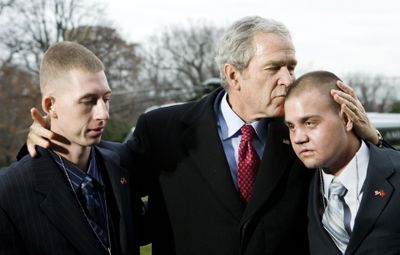Bush defends his record as commander in chief
Obama urged to keep pressure on al-Qaida

WASHINGTON – President Bush Tuesday urged President-elect Barack Obama to “stay on the offensive” against al-Qaida and other terrorist groups and said his own administration had “laid a solid foundation” for meeting emerging threats around the world.
Addressing cadets at the U.S. Military Academy in West Point, N.Y., Bush vigorously defended his performance as commander in chief, arguing that the wars in Afghanistan and Iraq and other operations were part of a concerted strategy to “keep unrelenting pressure” on terrorist groups and rogue states after the Sept. 11, 2001, attacks.
In his last scheduled address to a military academy, Bush also asserted that the nation’s military is “stronger, more agile and better prepared” than when he took office eight years ago.
“With all the actions we’ve taken these past eight years, we’ve laid a solid foundation on which future presidents and future military leaders can build,” Bush said. “… In the years ahead, our nation must continue developing the capabilities to take the fight to our enemies across the world. We must stay on the offensive. We must be determined, and we must be relentless to do our duty to protect the American people.”
The appearance was the latest in a series of valedictory interviews and speeches in which Bush has forcefully defended a presidency marked by war and political conflict. The remarks come six weeks before Bush is scheduled to hand over the White House to Obama, who has vowed to chart a dramatically different path than Bush on the use of military force and diplomacy overseas.
Yet Obama has chosen Bush’s current Pentagon chief, Robert M. Gates, to continue as defense secretary, while promising a shift in military resources from Iraq to Afghanistan and a greater emphasis on nonmilitary strategies in the fight against terrorism.
The address echoed a speech Bush delivered at West Point in June 2002, when he drew on the attack on Pearl Harbor to unveil a more aggressive, pre-emptive approach to the use of military force. “We must take the battle to the enemy,” he said during that speech.
Bush acknowledged Tuesday that the Iraq conflict has been “longer and more difficult than expected” but said that his decision to increase troop levels in early 2007 “set a framework for the drawdown of American forces as the fight in Iraq nears a successful end.”
Bush, who has expressed regret over the false intelligence that led to the Iraq war, did not mention the issue Tuesday. Instead, he characterized the U.S.-led invasion as a necessary act to remove a dangerous dictator, Saddam Hussein.
Bush also acknowledged that “al-Qaida’s top two leaders remain at large,” referring to Osama bin Laden and Ayman al-Zawahiri. But he asserted that his administration had “severely weakened” the organization and had forced bin Laden and Zawahiri into hiding.
“The day will come when they receive the justice they deserve,” Bush said.
Bush said that one of the biggest challenges of coming years will be “helping our partners assert control over ungoverned spaces,” including the northwest border region of Pakistan that offers haven to al-Qaida and other terrorist groups. U.S. and Pakistani officials have clashed in recent months over U.S. airstrikes aimed at militants along the Afghanistan-Pakistan border, but Bush signaled that such strikes would continue.